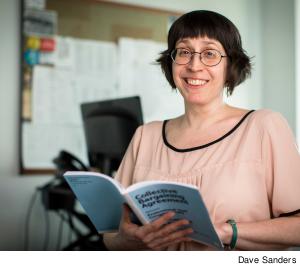“There are very few certainties in what we do.”
That’s how Renée Lasher explains the often moving, often unpredictable and often evolving work of contract administration.
 |
After six years as a coordinator of contract enforcement at the PSC, Lasher became director of contract enforcement at the beginning of 2018, taking over the position at a critical moment.
Lasher, who has already handled hundreds of PSC grievances over the course of her career, takes over for Debra Bergen, who served for more than two decades in the position before retiring at the end of 2017. Lasher says she enjoys the surprising range of contract enforcement at PSC, working with members in different titles at different campuses.
INTERPRETING THE CONTRACT
Contract administration and dealing with the minutiae of collective bargaining might sound tedious and repetitive, but it’s not, she insists. Lasher compares the debates about the contract between management and labor to constitutional arguments at the Supreme Court, calling the collective bargaining agreement “an organism that is not static,” even calling the process “Talmudic,” referring to the Jewish tradition of finding deeper meaning in religious law.
“What was the intent at the time this provision was bargained? What is past practice? How has technology changed things? Demographic changes, political changes – they all impact how the contract functions on a day-to-day basis,” she said. “Circumstances and interpretations change how the contract is being implemented and understood.”
A CUNY FAMILY
Lasher grew up in New York City in an activist family. She has early childhood memories of attending rallies in support of the Equal Rights Amendment and against apartheid in South Africa. After completing her master’s degree in theater management at Brooklyn College in 2000, she landed a job as a business agent at what was then called the Society of Stage Directors and Choreographers, which served as her first introduction working with a professional union.
After 12 years of representing members in the theater world, the PSC – at nearly 10 times the size of the choreographers’ and directors’ union in terms of membership – presented a new challenge to Lasher.
“It was an ‘expand my universe’ moment – it was super exciting,” Lasher said about joining the PSC staff.
It was a natural transition for Lasher, who comes from a CUNY family. Both her parents and she graduated from CUNY institutions. What’s more, many members of her theater union are also PSC members, she said.
Lasher takes on the director’s role at a particularly tumultuous time. The Supreme Court is expected to hand down a decision in Janus v. AFSCME this summer, one that most likely will prohibit collection of agency shop fees for public sector unions, a move that would endanger union finances.
But Lasher is optimistic nonetheless. In April the union hired two full-time contract coordinators: Emma Powell, formerly a PSC organizer, and Faye Moore, who previously served as president of Social Service Employees Union Local 371 (District Council 37) and, prior to that, as the union’s vice president of grievances and legal services. Lasher is working closely with part-time grievance officers and rank-and-file activists on day-to-day contract enforcement. After all, she said, “The contract is only as effective as we can enforce it.”
BEYOND GRIEVANCES
Lasher also noted that while filing grievances and representing members was a vital part of her work, it wasn’t the only thing her department does. Much of the job involves on-the-ground organizing assistance to the membership when it comes to the often complex world of the academic workplace.
“We spend more time on issues that are not grievances,” Lasher said, noting that grievance counselors in the union office and on campuses often spend a lot of time listening to faculty and staff who need advice about problems that are not contract violations – for example, how to respond to an evaluation the member believes is unfair. “So much of what we do is about helping members succeed at CUNY.”

